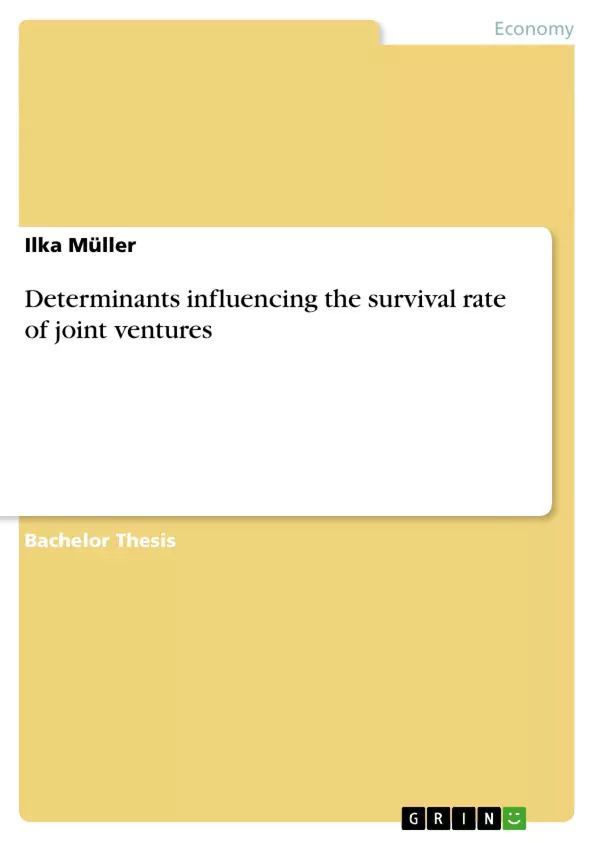Nowadays the world seems to be moving closer together and markets are becoming increasingly global. Firms take part in this globalization process and become international. A joint venture, particularly a cross-border joint venture, presents companies a promising oppor-tunity to expand into new markets. Joint ventures can help firms to broaden their geographical market participation, to acquire new knowledge, to create economies of scale and scope and, most importantly, reduce risks. The number of newly formed joint ventures is growing worldwide at an increasing pace. Yan (1998) discovered that the rate of alliance formation in the U.S. has been growing at an annual rate of more than 25 percent since 1985. A lot of the joint ventures endure for a long time but many do not. Kogut (1989) discovered a termination rate of international joint ventures of about 70%. There must be several reasons why they are vulnerable to instability and why so many fail. The aim of this thesis is to discuss which determinants have an impact on the survival of joint ventures. Guidelines are presented regarding aspects that need to be considered if a company wants to form strategic alliances with other firms. There are internal and external factors that influence the survival of joint ventures. Experts believe that some factors are con-troversial as they can influence the stability in a positive as well as in a negative way. No clear consensus is found yet. Therefore I describe their positive as well as their negative im-pacts on the longevity of a jointly owned entity.
Inhaltsverzeichnis (Table of Contents)
- 1 INTRODUCTION
- 2 THE JOINT VENTURE
- 2.1 WHAT IS A JOINT VENTURE?
- 2.2 DIFFERENT FORMS OF JOINT VENTURES
- 2.3 GOALS AND MOTIVES OF THE FORMATION
- 2.4 NEGATIVE EFFECTS FOR THE JOINT VENTURE PARENTS
- 3 HOW TO MEASURE JOINT VENTURE SURVIVAL
- 3.1 DIFFERENT METHODS IN THE LITERATURE
- 3.2 PROBLEM OF CLASSIFICATION
- 4 VARIABLES INFLUENCING THE SURVIVAL RATE OF JOINT VENTURES
- 4.1 INTERNAL FACTORS
- 4.1.1 Differences in equity ownership
- 4.1.2 Cultural distance
- 4.1.2.1 National culture differences
- 4.1.2.2 Corporate culture differences
- 4.1.3 Direct competition between the parents
- 4.1.4 Differences in size
- 4.1.5 Complementarity of partners' resource contribution
- 4.1.6 Economic linkages
- 4.1.7 Trust
- 4.1.8 Partners' joint venture experience
- 4.1.9 Organizational learning
- 4.1.10 Diversification strategy
- 4.2 EXTERNAL FACTORS
- 4.2.1 Risk and uncertainty in the host country
- 4.2.2 Currency fluctuation
- 4.2.3 Number of partners
- 5 SURVIVAL RATE FIGURES IN THE LITERATURE
- 6 NEGATIVE EFFECTS OF A DISSOLUTION
- 7 CONCLUSION
- Factors influencing the survival rate of joint ventures
- Internal factors such as cultural distance, equity ownership, and trust
- External factors like risk and uncertainty in the host country and currency fluctuation
- Different methods of measuring joint venture survival
- The negative effects of joint venture dissolution
Zielsetzung und Themenschwerpunkte (Objectives and Key Themes)
This bachelor's thesis examines the factors influencing the survival rate of joint ventures. The work aims to provide a comprehensive overview of the topic, analyzing both internal and external factors that impact the success or failure of joint ventures.
Zusammenfassung der Kapitel (Chapter Summaries)
Chapter 1 provides a brief introduction to the topic of joint ventures and outlines the scope of the thesis. Chapter 2 delves deeper into the concept of joint ventures, defining different forms, exploring the motivations behind their formation, and examining the potential negative effects for the parent companies involved. Chapter 3 discusses various methods used in the literature to measure joint venture survival, highlighting the challenges associated with classification. Chapter 4, the core of the thesis, analyzes the internal and external factors influencing the survival rate of joint ventures. Internal factors like differences in equity ownership, cultural distance, and trust are explored, along with external factors such as risk and uncertainty in the host country and currency fluctuation.
Schlüsselwörter (Keywords)
The key focus of this thesis is on joint ventures, their survival rate, and the factors that influence their success or failure. Internal factors such as cultural distance, equity ownership, and trust are analyzed, along with external factors like risk and uncertainty in the host country and currency fluctuation. The work utilizes various methods from the literature to measure joint venture survival and examines the negative effects of dissolution. This research contributes to a deeper understanding of the complex dynamics involved in joint venture relationships.
Frequently Asked Questions
What are the primary goals of forming a joint venture?
Firms form joint ventures to expand into new markets, acquire new knowledge, create economies of scale and scope, and reduce overall risks.
Why is the survival rate of international joint ventures so low?
Many joint ventures are vulnerable to instability due to factors like cultural distance, differences in equity ownership, and conflicting goals between parent companies.
How does cultural distance impact a joint venture's longevity?
Differences in both national and corporate cultures can lead to misunderstandings, lack of trust, and operational friction, negatively affecting stability.
What external factors influence the success of a joint venture?
Key external factors include political risk and uncertainty in the host country, currency fluctuations, and the total number of partners involved.
What role does trust play in the survival of a joint venture?
Trust is considered a critical internal factor; without it, partners are less likely to share resources effectively or resolve conflicts, leading to dissolution.
- Quote paper
- Ilka Müller (Author), 2007, Determinants influencing the survival rate of joint ventures, Munich, GRIN Verlag, https://www.grin.com/document/79372



